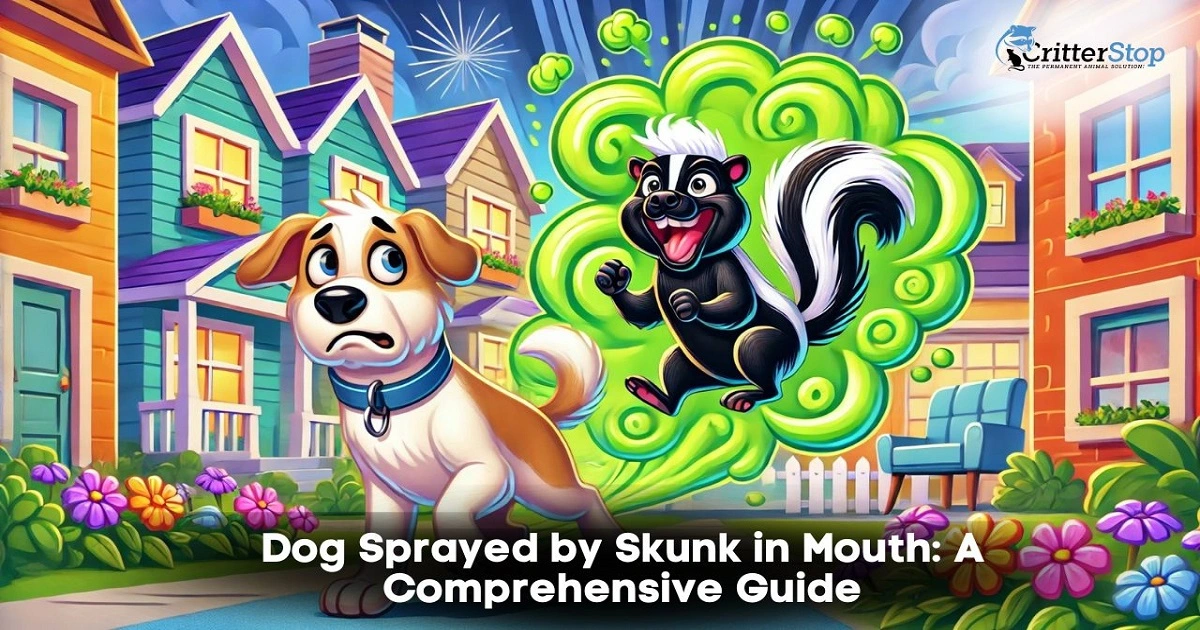
Dealing with a dog sprayed by a skunk in the mouth can be a distressing and overwhelming experience for any pet owner. The pungent odor and potential health risks necessitate immediate and effective action. This detailed guide provides step-by-step instructions, expert advice, and preventive measures to handle this situation efficiently.
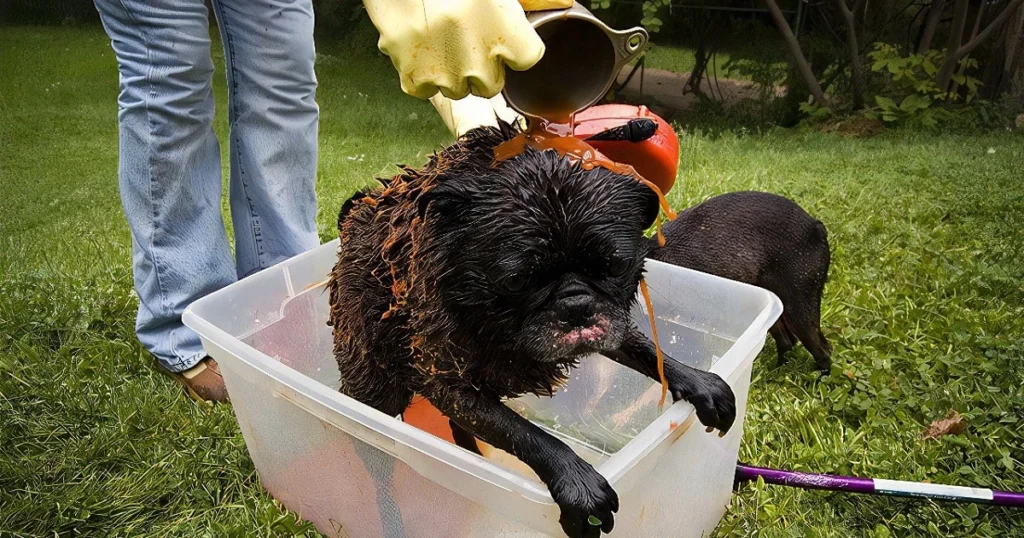
Skunk spray comprises thiols, sulfur-containing compounds responsible for its offensive odor. When a dog is sprayed directly in the mouth, these compounds can cause:
The first step is to isolate your dog to prevent the spread of the odor throughout your home. Perform a quick assessment to check for signs of distress, such as excessive drooling, vomiting, or difficulty breathing.
Using lukewarm water, gently rinse your dog’s mouth to remove as much skunk spray as possible. Be cautious not to force water down your dog’s throat, which could cause aspiration.
A popular and effective de-skunking solution includes:
Mix these ingredients in a plastic container and use them immediately. Do not store the solution, as it can become unstable over time. Follow these steps:
Several commercial products are designed specifically for de-skunking pets. These products can be a convenient alternative to homemade solutions. Follow the product instructions carefully for the best results.
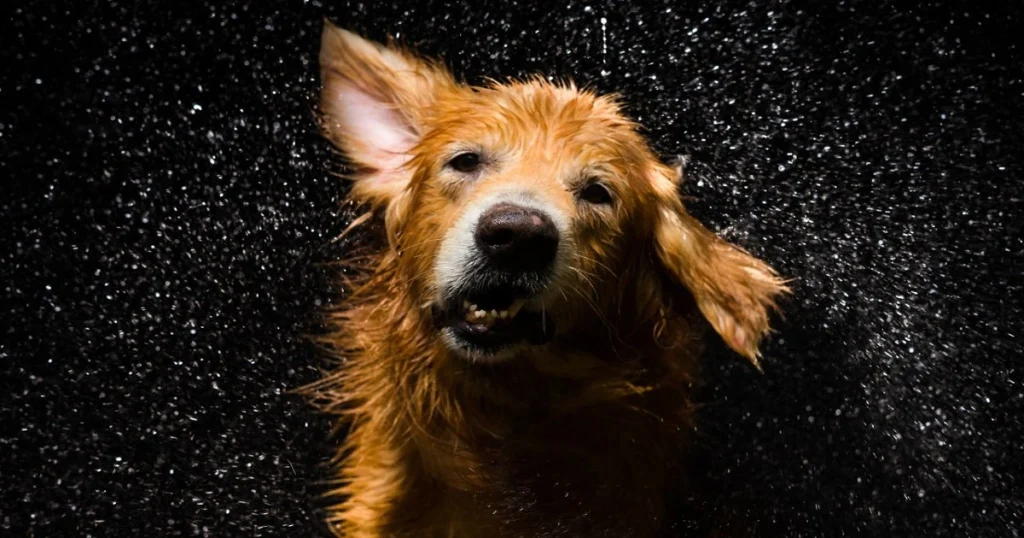
After de-skunking, examine your dog’s skin for any signs of irritation or chemical burns. If you notice any redness, swelling, or discomfort, consult your veterinarian promptly.
Monitor your dog for signs of lingering health issues such as persistent vomiting, lethargy, or respiratory distress. These symptoms may require professional veterinary attention.
To minimize the chances of future skunk encounters, take these preventive measures:
Training your dog to avoid skunks can also be beneficial. Use commands such as “leave it” to discourage your dog from approaching skunks. Supervise your dog during outdoor activities, especially at dawn and dusk, when skunks are most active.
When a dog is sprayed by a skunk, especially in the mouth, there are several health risks that owners need to be aware of:
It's crucial to know when to seek professional help. Contact your veterinarian if:
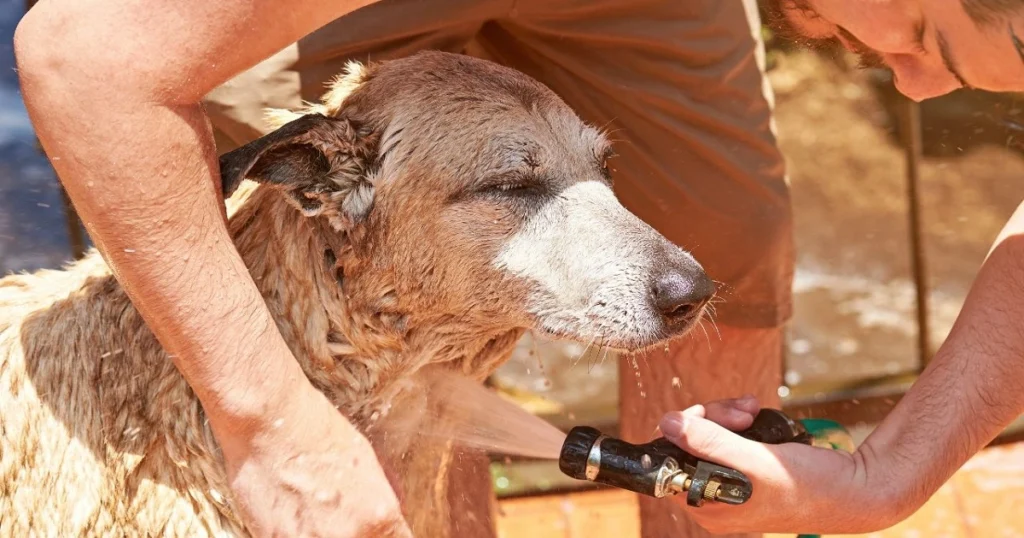
Another effective home remedy involves using vinegar:
Activated charcoal can help absorb the skunk odor from your dog’s mouth. Consult your veterinarian before administering it to ensure it's safe and appropriate for your pet.
Skunk spray can linger in your home, especially if your dog has brought the smell inside. Here are some steps to mitigate the odor:
Learning about skunk behavior can help you prevent future incidents:
Behavioral training can significantly reduce the risk of skunk encounters:
Utilize skunk deterrents to keep your yard skunk-free:
Encouraging community awareness and cooperation can also help reduce skunk encounters:
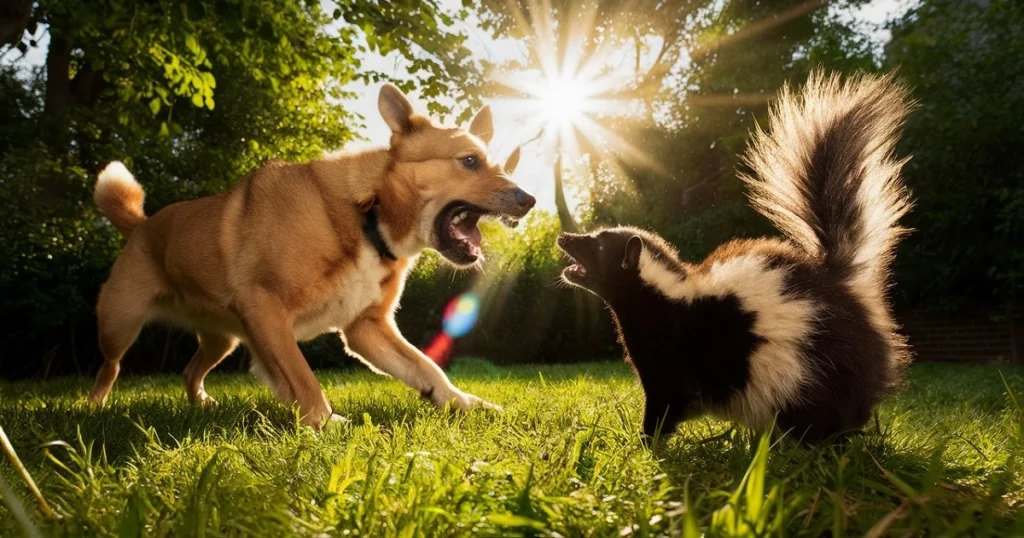
Managing a dog sprayed by a skunk in the mouth is a challenging but manageable situation with the right knowledge and resources. Immediate action, effective cleaning methods, and preventive measures can help ensure your dog’s safety and comfort while minimizing the impact of skunk spray.
For any wildlife removal needs, such as dealing with skunks or pest problems like ants in the bedroom, we highly recommend calling Critter Stop at (214) 234-2616. Critter Stop is renowned for its high-quality work and excellent customer service, as evidenced by its fantastic reputation and glowing customer reviews online. They offer professional, humane wildlife removal services and can provide a free inspection to solve pest problems efficiently.
When your dog gets sprayed by a skunk, especially in the mouth, it can be a traumatic experience for both you and your pet. This FAQ section addresses the most common concerns and provides detailed answers to help you handle this situation effectively.
If your dog still smells like skunk after a month, it’s likely because skunk spray is incredibly persistent and can cling to fur and skin for an extended period. The initial treatment might not have removed all the oils from the spray. Repeated washings with de-skunking solutions may be necessary. Additionally, consider professional grooming services to ensure a thorough cleaning.
If your dog is sprayed by a skunk in the mouth, rinse it immediately with lukewarm water to remove as much of the spray as possible. Avoid forcing water down its throat. Then, clean its fur using a specialized de-skunking solution. Monitor your dog for any signs of distress and contact your veterinarian if symptoms persist.
Treating a dog sprayed in the mouth by a skunk involves a few critical steps. First, rinse the dog's mouth with lukewarm water. Next, use a de-skunking solution on the fur, being careful to avoid the dog's eyes and mouth. Keep a close eye on your pet for any signs of respiratory issues or gastrointestinal upset, and seek veterinary care if needed.
If your dog smells like skunk but wasn't directly sprayed, they might have rolled in an area where a skunk had sprayed. Skunk spray can linger in the environment, and your dog could pick up the odor. A thorough bath with a de-skunking shampoo should help remove the smell. If the odor persists, consider consulting a professional groomer.
Foaming at the mouth after a skunk spray can indicate that the spray got into your dog's mouth and is irritating. Rinse your dog's mouth with lukewarm water gently. If foaming continues, it’s essential to consult your veterinarian, as your dog may require medical treatment to alleviate the irritation.
Skunk spray in your dog’s mouth can lead to several health risks, including severe irritation of the mucous membranes, gastrointestinal upset, and even respiratory distress if inhaled. In rare cases, it can cause a condition known as Heinz body anemia, which affects red blood cells. Immediate rinsing and veterinary consultation are crucial.
If your dog swallowed skunk spray, it’s important to rinse its mouth with water to remove as much of the substance as possible. Monitor it closely for signs of gastrointestinal distress, such as vomiting or diarrhea. Contact your veterinarian for further advice, as ingestion can sometimes lead to more serious health issues.
To effectively remove skunk spray from your dog, use a mixture of hydrogen peroxide, baking soda, and liquid dish soap. Apply this solution to your dog's fur, avoiding the eyes and mouth, and let it sit for 5-10 minutes before rinsing thoroughly with lukewarm water. Repeat if necessary, and follow up with a regular pet shampoo to help remove any remaining odor.
Yes, skunk spray can be toxic to dogs if ingested or if it gets into their eyes or mucous membranes. It can cause severe irritation, nausea, vomiting, and in rare cases, a blood disorder known as Heinz body anemia. Immediate decontamination and veterinary care are recommended if your dog is exposed to skunk spray.
If your dog gets skunk spray in its eyes, rinse it gently with lukewarm water or a saline solution. Avoid rubbing it, as this can cause further irritation. If redness or swelling persists, contact your veterinarian for further treatment. They may need medicated eye drops to alleviate the irritation.
Yes, skunk spray can hurt dogs. It contains chemicals that can significantly irritate the eyes, nose, mouth, and skin. The strong odor can also cause nausea and vomiting if ingested. It’s important to act quickly to minimize these effects and provide relief to your pet.
If your dog is sprayed by a skunk in the mouth, immediately rinse it with lukewarm water. Avoid forcing water down its throat. Clean its fur with a de-skunking solution, keeping it away from its eyes and mouth. Monitor for any signs of distress, and consult your veterinarian if symptoms persist.
If your dog’s urine smells like skunk, it could be due to residual skunk spray on its fur that transferred to its urine. Another possibility is that your dog ingested some of the spray, affecting the smell of its urine. A thorough cleaning and monitoring for any health issues are advisable. If the smell persists, consult your veterinarian.
To clean a dog sprayed by a skunk, use a mixture of hydrogen peroxide, baking soda, and liquid dish soap. Apply the solution to your dog’s fur, avoiding the eyes and mouth, and let it sit for 5-10 minutes. Rinse thoroughly with lukewarm water and repeat if necessary. Follow up with a regular pet shampoo to help remove any remaining odor.
Skunk spray is not typically poisonous to dogs, but it can cause severe irritation and discomfort. Ingestion can lead to gastrointestinal upset, and exposure to the eyes or mucous membranes can cause significant irritation. In rare cases, it can lead to more serious health issues, so immediate cleaning and veterinary care are recommended.
If a skunk sprays your dog in the mouth, rinse it with lukewarm water immediately. Avoid forcing water down its throat. Use a de-skunking solution to clean its fur, avoiding the eyes and mouth. Monitor your dog for signs of distress and consult your veterinarian if symptoms persist or worsen.
When a dog gets sprayed by a skunk, the first step is to keep them outside to prevent the odor from spreading indoors. To clean their fur, use a de-skunking solution, such as a mixture of hydrogen peroxide, baking soda, and liquid dish soap. Rinse thoroughly with lukewarm water, repeat if necessary, and monitor your dog for any signs of health issues.
For skunk spray in a dog’s mouth, rinse their mouth gently with lukewarm water. Avoid forcing water down their throat. Clean their fur with a de-skunking solution, being careful around the mouth and eyes. Monitor your dog for any signs of gastrointestinal or respiratory issues and seek veterinary care if needed.
Mix hydrogen peroxide, baking soda, and liquid dish soap to get skunk spray off your dog. Apply this solution to your dog’s fur, avoiding the eyes and mouth, and let it sit for 5-10 minutes. Rinse thoroughly with lukewarm water and repeat the process if necessary. Follow up with a regular pet shampoo to remove any remaining odor.
If your dog is sprayed in the mouth by a skunk, rinse its mouth with lukewarm water immediately. Avoid forcing water down its throat. Clean its fur with a de-skunking solution, being careful to avoid the mouth and eyes. Monitor your dog for any signs of distress and consult your veterinarian if symptoms persist or worsen.
The best solution for skunk spray on a dog is a mixture of hydrogen peroxide, baking soda, and liquid dish soap. This homemade remedy effectively neutralizes the odor. Apply the solution to your dog’s fur, avoiding the eyes and mouth, let it sit for 5-10 minutes, then rinse thoroughly with lukewarm water. Repeat as necessary and follow up with a regular pet shampoo.
Yes, skunk spray can burn a dog’s skin due to the sulfur compounds it contains. These chemicals can cause irritation, redness, and discomfort. It’s important to clean your dog thoroughly with a de-skunking solution and rinse well to remove all traces of the spray. If skin irritation persists, consult your veterinarian for further treatment.
If your dog is sprayed in the mouth by a skunk, rinse it immediately with lukewarm water to remove as much of the spray as possible. Avoid forcing water down its throat. Use a de-skunking solution to clean its fur, avoiding the mouth and eyes. Monitor your dog for respiratory or gastrointestinal distress signs and seek veterinary care if necessary.
If your dog gets sprayed in the mouth by a skunk, rinse its mouth gently with lukewarm water. Avoid forcing water down its throat. Clean its fur with a de-skunking solution, avoiding the mouth and eyes. Monitor your pet for any signs of health issues such as vomiting, coughing, or difficulty breathing, and consult your veterinarian if needed.
For skunk spray in your dog's eyes and mouth, rinse their eyes with lukewarm water or a saline solution to reduce irritation. Rinse their mouth with lukewarm water, avoiding forcing water down their throat. Clean their fur with a de-skunking solution, avoiding the eyes and mouth. If irritation persists, consult your veterinarian for further treatment.
Skunk spray can have several effects on dogs, including severe irritation of the eyes, nose, mouth, and skin. Ingestion can cause nausea, vomiting, and gastrointestinal distress. In rare cases, it can lead to Heinz body anemia, a blood disorder. Immediate decontamination and veterinary care are essential to mitigate these effects and ensure your dog's health and comfort.
For more assistance with wildlife issues or pest control, Critter Stop offers professional and humane removal services. If you're dealing with skunk problems or need help with ant removal from your bedroom, call Critter Stop at (214) 234-2616 for a free inspection. Critter Stop has a fantastic reputation and customer reviews online because it provides high-quality work and great customer service.
Visit our Critter Library and learn more about our furry friends